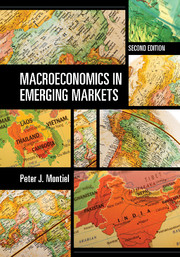Book contents
- Frontmatter
- Contents
- Preface
- PART 1 THE MACROECONOMIC FRAMEWORK
- 1 Introduction and Overview
- 2 Concepts and Definitions: The Macroeconomic Accounts
- 3 Short-Run Macroeconomics and Long-Run Growth
- PART 2 A BENCHMARK MACROECONOMIC MODEL
- PART 3 PUBLIC FINANCE AND MACROECONOMIC PERFORMANCE
- PART 4 MONETARY INSTITUTIONS AND MONETARY POLICY
- PART 5 EXCHANGE RATE MANAGEMENT
- PART 6 THE FINANCIAL SECTOR AND MACROECONOMIC PERFORMANCE
- PART 7 VARIETIES OF EMERGING-MARKET CRISES
- Index
- References
3 - Short-Run Macroeconomics and Long-Run Growth
Published online by Cambridge University Press: 05 June 2012
- Frontmatter
- Contents
- Preface
- PART 1 THE MACROECONOMIC FRAMEWORK
- 1 Introduction and Overview
- 2 Concepts and Definitions: The Macroeconomic Accounts
- 3 Short-Run Macroeconomics and Long-Run Growth
- PART 2 A BENCHMARK MACROECONOMIC MODEL
- PART 3 PUBLIC FINANCE AND MACROECONOMIC PERFORMANCE
- PART 4 MONETARY INSTITUTIONS AND MONETARY POLICY
- PART 5 EXCHANGE RATE MANAGEMENT
- PART 6 THE FINANCIAL SECTOR AND MACROECONOMIC PERFORMANCE
- PART 7 VARIETIES OF EMERGING-MARKET CRISES
- Index
- References
Summary
Why should someone who is primarily interested in long-run growth in emerging and developing economies be concerned with the short-run macroeconomic performance of those economies? This is an important question for this book to address because the chapters that follow will all be concerned with short-run macroeconomic performance in countries whose primary aspiration is to improve their long-run growth performance. The answer is that a country's short-run macroeconomic performance can have an important effect on its long-run growth rate. Indeed, over the past two decades, a significant consensus has emerged among professional economists and policy makers in developing countries that certain aspects of short-run macroeconomic performance – getting key macroeconomic relative prices right and providing a stable and predictable domestic macroeconomic environment – play important roles in inducing the accumulation of productive factors and improvements in productivity that are the basic ingredients of long-term economic growth. A wide array of evidence is consistent with this proposition, derived both from case studies of successful and unsuccessful developing economies and from cross-country experience. The growing attention paid to macroeconomic issues by development-oriented institutions such as the World Bank and various regional development banks is one consequence of this new perception.
- Type
- Chapter
- Information
- Macroeconomics in Emerging Markets , pp. 45 - 74Publisher: Cambridge University PressPrint publication year: 2011
References
- 1
- Cited by



